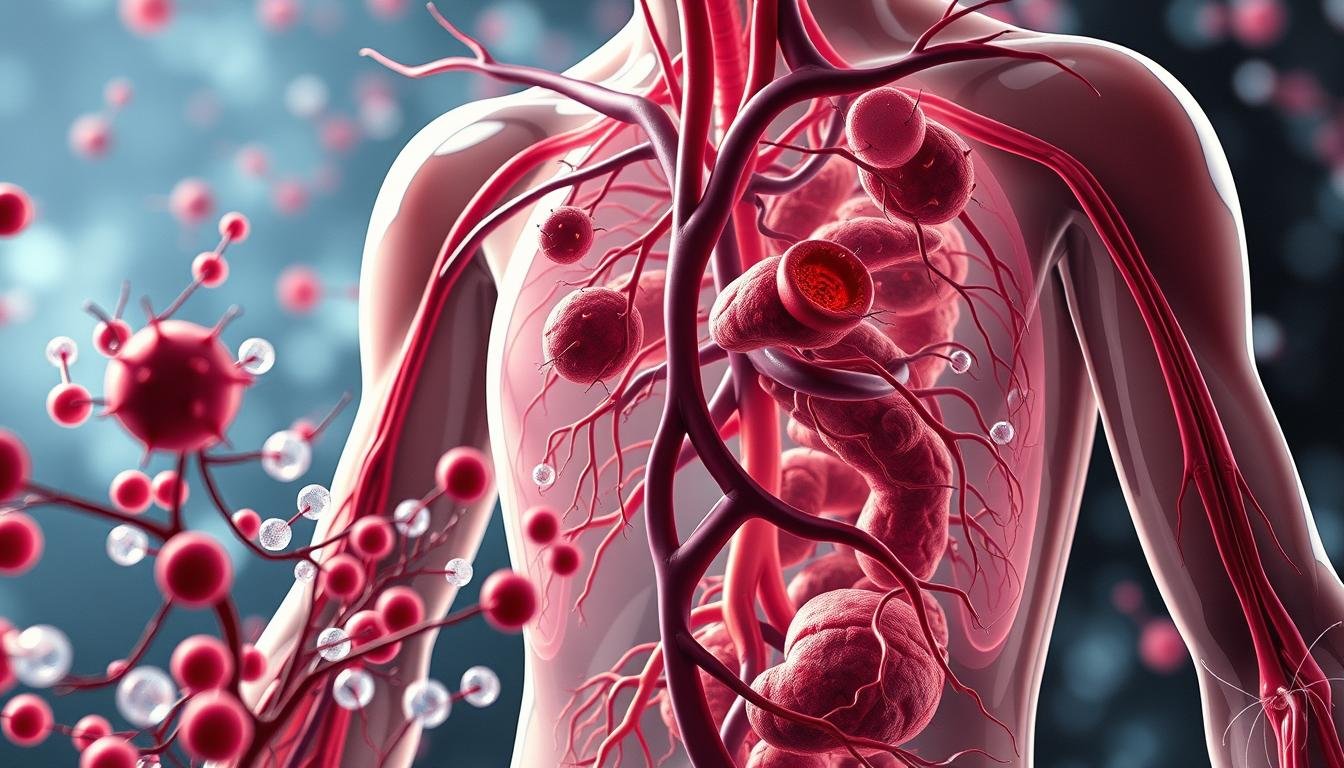Ever wondered why some folks never seem to fall ill? It’s all about their robust immune system1. A strong immune system is vital for staying healthy and dodging sickness. It acts as a shield against diseases. A healthy immune system is the backbone of well-being, thanks to a balanced diet, regular exercise, and enough sleep2.
Let’s dive into the world of immune systems. We’ll share tips on avoiding sickness and highlight the importance of a strong immune system. We’ll look at how nutrition, lifestyle, and mental health impact immune health3. Our aim is to equip you with the knowledge to enhance your immune system and maintain health.
Key Takeaways
- A strong immune system is essential for staying healthy and avoiding sickness.
- Nutrition, lifestyle choices, and mental health all play a role in maintaining a healthy immune system1.
- Regular exercise, adequate sleep, and a balanced diet are all important for boosting the immune system2.
- Stress management and mindfulness can also help support immune function3.
- By incorporating these tips into our daily lives, we can help keep our immune systems strong and reduce the risk of illness.
Understanding Immunity and Health
Exploring what makes our immune system strong is key. Our genes and lifestyle choices play big roles. The immune system fights off sicknesses, keeping us healthy. By choosing healthy habits, we can make our immune system even stronger4.
Over the past 25 years, fewer people have been vaccinated. This has led to more measles cases5. Vaccines are vital for keeping everyone healthy. Also, exercising, eating right, and managing stress can help our immune system work better4.
- Engage in regular physical activity to boost your immune response
- Follow a balanced diet rich in fruits, vegetables, and whole grains
- Manage stress through mindfulness and relaxation techniques
Adding theseimmune-boosting habitsto our lives can help our immune system. This way, we can fight off illnesses better5.
Nutrition: Fuel for the Body
Nutrition is key to a healthy immune system. A balanced diet gives the body what it needs to work right. Research shows over half of American adults want to lose weight but don’t know how6. This shows how important nutrition is for our health.
A good diet includes many superfoods full of vitamins and minerals. Foods like citrus fruits and leafy greens are great for the immune system. Drinking lots of water is also important to stay healthy. A study found walking 2,000 steps a day can lower death risk6.
It’s vital to watch what we eat and make smart choices. With so much wrong information out there, it’s key to trust reliable sources and health experts. By choosing wisely, we can keep our immune system strong and stay healthy.
| Food | Nutrient | Benefit |
|---|---|---|
| Citrus Fruits | Vitamin C | Boosts immune system |
| Leafy Greens | Iron | Supports healthy red blood cells |
| Nuts and Seeds | Protein | Supports muscle growth and repair |
The Power of Mental Health
Mental health is key to a strong immune system. We can keep our minds healthy by managing stress, being mindful, and thinking positively. These habits help us feel better and stay healthy.
Stress can harm our immune system, causing inflammation and weakening it7. But, mindfulness and meditation can lower stress and boost our mental and immune health8. Positive thinking also helps by reducing stress and anxiety, making us feel better overall.
Here are some ways to keep your mental health strong:
- Practice mindfulness and meditation to calm your mind and body.
- Exercise regularly to lower stress and lift your mood.
- Get enough sleep to help manage stress and keep your immune system strong.
- Stay connected with others to build a strong support network.
By focusing on mental health and using these strategies, we can boost our well-being and fight off illness. Studies show that mental health is linked to our immune system, and caring for our minds helps our bodies too7. Creating a supportive and understanding environment helps people face their emotions and start healing8.

Sleep: The Unsung Hero
Sleep is often overlooked, but it’s key to a strong immune system. While we sleep, our body fixes damaged cells and builds new ones. It also strengthens our immune system9. A good night’s sleep helps our immune system work right, lowering the chance of getting sick.
To sleep better, keep a regular sleep schedule and a calming bedtime routine. You might read a book, take a warm bath, or do some gentle stretches. A quiet, dark room helps too, as it lets our body make melatonin, the sleep hormone9.
Here are some ways to sleep better:
- Go to bed and wake up at the same time every day.
- Stay away from caffeine and screens before bed.
- Have a relaxing bedtime routine.
- Exercise regularly, but not right before bed.
Not getting enough sleep weakens our immune system, making us more likely to get sick. It also messes with our mood and thinking skills. By valuing sleep, we keep our immune system strong and avoid sleep problems9.
Physical Activity and Immune Response
Regular physical activity is key for a healthy immune system. Exercise boosts the immune response by increasing white blood cells. These cells fight off infections10. It also reduces inflammation, which weakens the immune system. A mix of aerobic, strength, and flexibility exercises keeps the immune system strong.
Some exercises that boost the immune response include:
- Brisk walking
- Running
- Swimming
- Cycling
- Yoga
Finding the right balance between exercise and rest is vital. Overexertion can weaken the immune system11. Listening to your body and taking breaks helps prevent burnout and keeps the immune system healthy.
Adding physical activity to your daily routine supports your immune system. It reduces illness risk. Always consult a healthcare professional before starting a new exercise program, even with no health issues12.
| Exercise Type | Benefits |
|---|---|
| Aerobic Exercise | Improves cardiovascular health, increases white blood cell production |
| Strength Training | Builds muscle mass, improves bone density |
| Flexibility Exercises | Improves range of motion, reduces injury risk |
Social Connections and Health
Social connections are key to a healthy immune system and overall well-being. They impact our physical and mental health deeply. Studies show that strong social ties are linked to lower blood pressure and healthier body mass indexes. They also reduce the risk of depression and anxiety13.
People with strong social connections are more likely to adopt healthy habits. This includes regular exercise and a balanced diet. These habits are good for our health.
Having a supportive community is vital for our well-being. It gives us a sense of belonging and support. We can nurture our relationships with family and friends and expand our social circle to include like-minded people14.
This way, we build a network of people who offer emotional support and practical help. Such connections are essential for our health and well-being.
To build a supportive community, we can join social clubs or groups that match our interests. Volunteering for causes we care about and participating in community events are also good steps. These actions help strengthen our social connections and improve our overall health and happiness.

It’s also important to know the health risks of loneliness. Loneliness can lead to high blood pressure, a weakened immune system, and a higher risk of depression and anxiety. By focusing on our social connections, we can lower these risks and enhance our well-being13.
Hygiene Practices That Matter
Good hygiene is key to a healthy immune system. Handwashing is a big part of staying healthy. It helps lower the chance of getting sick3. Also, washing new dishes and cookware before use can stop bad tastes in food3.
Regular check-ups and vaccines are also important. They help prevent sickness and keep us well. Good hygiene and care can keep us healthy and stop sickness from spreading. Proper hygiene practices are vital for our health.
Good hygiene isn’t just about washing hands. It’s also about keeping our surroundings clean. Avoiding sick people and not sharing things is important too. For example, using bleach spray can help keep us safe3.
Environmental Factors in Health
Environmental factors greatly affect our health and happiness. For example, air quality can weaken our immune system, making us more likely to get sick4. Being in nature can also help, by lowering stress and improving our mood.
It’s key to think about how environmental factors impact our health. This includes the air we breathe and how much time we spend outside. By working to make the air cleaner and spending more time in nature, we can strengthen our immune system and lower illness risk.
To better the air quality, we can use air purifiers, cut down on pollution, and open windows more. Also, just going for a walk in a park or hiking can be beneficial. Adding these activities to our daily lives can greatly improve our health and happiness15.
Embracing Lifelong Learning and Adaptation
Understanding why some people rarely get sick is complex. It involves more than just luck or genetics. It’s about staying informed, adapting our habits, and making a wellness plan that fits us.
The Importance of Staying Informed
It’s vital to keep up with new research and health tips. This helps us improve our immune system. By being curious and active, we learn how to better support our bodies16.
Regular exercise, a healthy diet, managing stress, and good sleep are key. These are the pillars of a strong immune system we’ve talked about.
Adapting Health Habits Over Time
Our bodies and needs change as we age16. What worked when we were younger might not now. So, we need to adjust our health habits.
Being open to new ideas helps us stay healthy and avoid illness. This flexibility is key to thriving as we get older.
Creating a Personal Wellness Plan
Making a wellness plan that fits us is essential for long-term health16. This might mean more social activities, better sleep, or trying new exercises. Taking charge of our health empowers us to live fully.
The path to a strong immune system is lifelong. By learning, adapting, and being proactive, we can avoid sickness and enjoy life to the fullest1617.
FAQ
What is the importance of having a strong immune system?
What factors contribute to a healthy immune system?
What are some key nutrients and superfoods that can boost the immune system?
How does stress impact the immune system?
What role does sleep play in maintaining a healthy immune system?
How can regular exercise benefit the immune system?
How do social connections impact overall health and immunity?
What hygiene practices are important for maintaining a healthy immune system?
How can environmental factors affect the immune system?
Why is it important to stay informed and adapt health habits over time?
Source Links
- John Marshall sweethearts open up about chronic illness
- Pope Francis believes ‘papacy is for life,’ says historian-biographer
- Should You Wash New Dishes Before You Use Them?
- The Scary Things RFK Jr. Said — And Didn’t Say — About The Measles
- Parents deserve the truth about the measles vaccine and how it protects lives | Opinion
- The Weight of Weight Loss: Measuring Success Beyond the Scale
- 5 Ways to Beat Post-Viral Blues
- Is There a Right Way to Hold Space for Someone in Crisis?
- Which canine ‘unsung hero’ do you think deserves the Kennel Club Hero Award? Read their amazing stories and cast your vote
- Media Panic Over Measles Distracts From Real Threats to Kids’ Health and Safety
- 7 Autoimmune Red Flags You Might Be Ignoring
- Young and healthy father nearly dies after ‘sneezing too hard’
- Sterling K. Brown Reveals the “Healing” Secret to His Long Marriage
- Social media told me ‘manifesting’ would change my life…not ruin it
- Unprecedented domoic acid outbreak harms sea lions along Malibu beaches • The Malibu Times
- Aging Well – HelpGuide.org
- How Different Psychologists Have Evaluated Intelligence















Leave a Reply